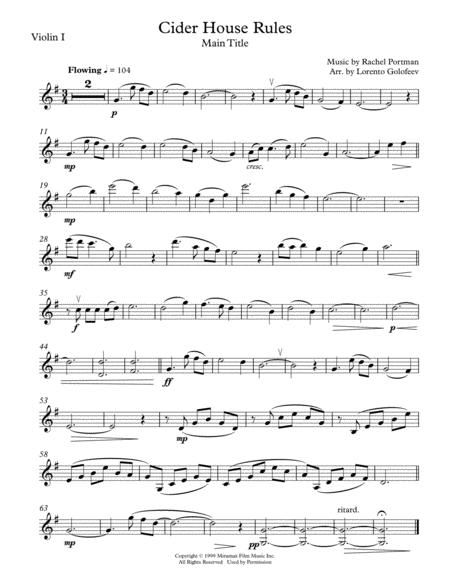
While working at an apple orchard, Homer falls for the beautiful Candy (Charlize Theron - Reindeer Games, The Devil's Advocate), and learns some powerfully indelible lessons about life, love, and home. Larch (Caine), to be his successor, Homer nonetheless feels the need to strike out on his own and experience the world outside. Homer Wells (Tobey Maguire - Pleasantville, The Ice Storm) has lived nearly his entire life within the walls of St. GradeSaver, 9 March 2019 Web.Honored with two Academy Awards - Best Supporting Actor, Michael Caine, and Best Adapted Screenplay, John Irving - "The Cider House Rules" tells a compelling and heartwarming story about how far a young man must travel to find the place where he truly belongs.
The cider house rules how to#
Next Section Quotes Previous Section Glossary How To Cite in MLA Format Anonymous "The Cider House Rules Themes". Will review the submission and either publish your submission or provide feedback. You can help us out by revising, improving and updatingĪfter you claim a section you’ll have 24 hours to send in a draft. Although Angel doesn't know his true parentage, he still senses the strange dynamic between his three parental figures. Once Wally returns, Homer relinquishes his claim to fatherhood and turns his attention to Dr. In fact he's never given the opportunity to know Homer well. Homer's son Angel grows up thinking he is an orphan because of a lie. Kids like Homer grow up feeling unwanted which seems to be propagated in their children as well. All of these kids have been put up for adoption by young mothers who were not prepared to raise children on their own or in whatever circumstances they find themselves. After they graduate, they're on their own. He does not, however, mentor or "parent" the kids because he refuses to be emotionally vulnerable with them. Unwilling to start his own family, he provides a safe growing environment for kids without families. In this book it's a consistent theme throughout the text.

No doubt stemming from Irving's own childhood, he writes a great deal about abandonment. In fact the deception, though everyone is aware of it, is never outright talked about, so Homer never receives closure regarding Angel. Behind his back, Homer and Candy continue to have an affair for fifteen years afterwards. Attempting to spare Wally the insult, Homer and Candy decide to tell everyone that the baby is adopted. After Candy has a baby with him, they both are shocked when Wally returns home having been injured instead of killed in the war. Homer invents his own critical lie in his private life. It takes him years to move past the initial hurt. Regardless, Homer is devastated to learn that he's been lied to all these years. After hearing about the horrors of unlicensed abortion clinics, he silently takes up the practice in order to save the girls from certain trauma and possible death. He's also somewhat ashamed for his practice since he's morally opposed to abortion in most situations, but he's often dealing with girls who are victims of rape and incest. He cannot allow the children to know how narrowly they escaped death by possessing that knowledge. Larch keeps it a secret from his orphans that he performs abortions.

Each believes they have substantially acceptable motivations for the deception, however. Perhaps representative of this lack of authority, the characters all do their fair share of lying. All of these characters or somewhat transient and impulsive, not having been tied down to traditional authority structures. Although as a family friend, Homer is a part of Angel's life, the boy doesn't know that Homer is his real dad. Finally, Angel has a unique situation of not knowing his real father very well. They're headstrong kids who get in too deep.

Similarly, Candy and Wally don't have parents in the picture either, although little is known about their childhoods. Lacking traditional authority figures, Homer grows up to make questionable moral decisions no the least of which is having a baby with a woman and then telling her husband they adopted it from St. Larch by making himself useful and demonstrating great promise in the medical field. This idea of being totally alone seems to be the central theme of the book. Most of the character is this novel either have never met their parents or don't know who their real parents are. Written by people who wish to remain anonymous We are thankful for their contributions and encourage you to make your own. These notes were contributed by members of the GradeSaver community.


 0 kommentar(er)
0 kommentar(er)
